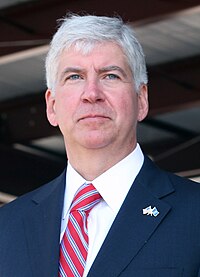Michigan Governor
| Governor of Michigan | |
|---|---|

Seal of Michigan
|
|
| Style | The Honorable |
| Residence | Michigan Governor's Mansion |
| Term length | Four years, renewable once |
| Inaugural holder | Stevens T. Mason |
| Deputy | Brian Calley |
| Salary | $159,300 (2013) |
| Website | http://www.michigan.gov/snyder |
The governor of Michigan is the head of the executive branch of Michigan's state government and serves as the commander-in-chief of the state's military forces. The governor has a duty to enforce state laws; the power to either approve or veto appropriation bills passed by the Michigan Legislature; the power to convene the legislature; and the power to grant pardons, except in cases of impeachment. He or she is also empowered to reorganize the executive branch of the state government.
Michigan was originally part of French and British holdings, and administered by their colonial governors. After becoming part of the United States, numerous areas of what is today Michigan were originally part of the Northwest Territory, Indiana Territory and Illinois Territory, and administered by territorial governors. In 1805, the Michigan Territory was created, and five men served as territorial governors, until Michigan was granted statehood in 1837. Forty-eight individuals have held the position of state governor. The first female governor, Jennifer Granholm, was elected in 2003.
After Michigan gained statehood, governors held the office for a two-year term, until the 1963 Michigan Constitution changed the term to four years. The number of times an individual could hold the office was unlimited until a 1992 constitutional amendment imposed a lifetime term limit of two four-year governorships. The longest-serving governor in Michigan's history was William Milliken, who was promoted from lieutenant governor after Governor George W. Romney resigned, then was elected to three further successive terms.
...
Wikipedia

